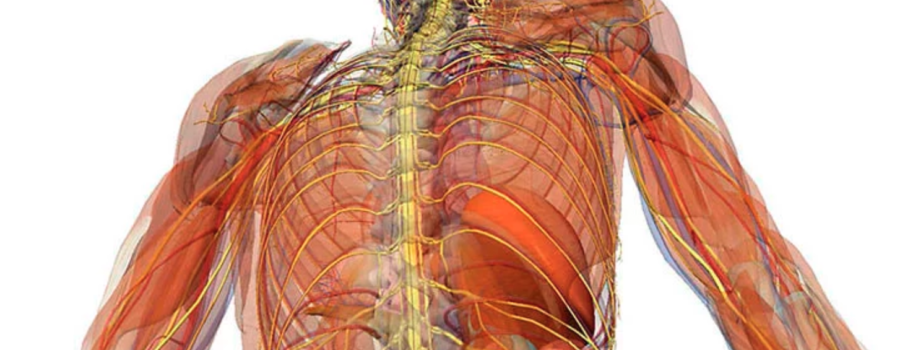Vagus Nerve the Body Mind Connection
INFORMATION FROM OUR 7 WEEK DETOX PROGRAM
The Vagus nerve is the 10th cranial ventricle, which extends from the colon to the brain with mostly upward firing neurons. It is the longest of our 12 cranial nerves, the longest nerve system is spinal column. About 90% of its nerve fibres signal information from the body to the brain. These nerve fibres existing throughout your stomach and intestines are referred to as your enteric brain.

This is why the vagus nerve is a key player in the body-mind connection, with 90% of the fibres sending information to the brain, this is what causes you to have that gut instinct, the knot in your throat, your gut feeling and even the sparkle in your smile. You can think of the vagus nerve as an important communication system in your body, helping you stay in touch with your sensations and emotions.
The Nerve fibre from the body to the brain is referred to as the “enteric nervous system” (ENS), which governs the function of the gastrointestinal tract, communicates with the central nervous system (the brain) via the vagus nerve. This is known as the gut-brain axis, the pathway between cognitive and emotional centres to the brain.
It also branches out to touch and interact with the liver, spleen, gallbladder, ureter, female fertility organs, neck, ears, tongue, and kidneys.
The management and processing of our emotions happens via the vagal nerve between the heart, brain and gut, which is why we have a strong gut reaction to intense mental and emotional states.

It powers up our involuntary autonomic nerve centre—our parasympathetic nervous system—and controls unconscious body crucial functions, as well as everything from keeping our heart rate constant and food digestion to breathing and sweating. It also helps regulate blood pressure and blood glucose balance, promotes general kidney function, helps release bile and testosterone, stimulates the secretion of saliva, assists in controlling taste and releasing tears, and plays a major role in fertility issues and orgasms in women.
The vagus nerve goes from the first energy centre up to the crown (7th energy centre). The vagus nerve is extremely critical to your overall health and is closely connected to multiple organs and systems throughout of the body.
The function of the Vagus nerve (which is interestingly enough really a pair of nerves referred to as One) is to “collect data” from all the organs and glands of the body, including the stomach and heart, thymus and thyroid, and bring this information to the brain for deduction.
The vagus nerve is essential for keeping your immune balanced. There is a close connection between chronic stress, immune functioning, and inflammation. With short-term activation, the fight and flight stress response, your sympathetic nervous system releases of cortisol hormones and helps keep your immune system at healthy levels. Long-term stress suppresses immunity. However, chronic traumatic stress has an inverse reaction, leaving your immune system unbalanced which leads to inflammation in the body.
The vagus nerve:
• prevents and used to treat inflammation in the body
• helps our memory function
• helps us breathe
• controls the heart rate via electrical impulses
• helps us to relax and be in a calm state
• communicates between the gut and the brain
• stimulation for the treatment of epilepsy
Activation of the vagus nerve keeps your immune system in check and releases an assortment of hormones and enzymes such as acetylcholine and oxytocin. This results in reductions in inflammation, improvements in memory, and feelings of relaxation. Vagus nerve stimulation and activation has also been shown to reduce allergic reactions and tension headaches.
Meanwhile, the vagus nerve stimulation and activation has been shown to improve conditions such as:
- Cardiovascular Disease
- Anxiety
- Tinnitus
- Obesity
- Alcohol dependence
- Migraines & Headaches
- Alzheimer’s
- Leaky gut
- Poor Digestion
- Blood Pressure
- Kidneys
- Poor Elimination System
- Liver Toxin Overload
- Poor memory
- Poor blood circulation
- Mood swings
- Cancer
We know when we are “too hot” when we feel uptight, anxious, irritable, or panicky. When we are too “too cold” when we are shut down, depressed, or feeling hopeless. Knowing how we can regulate our nervous system and activate the vagus nerve, the parasympathetic nervous system is a key to reduce stress, tension, pain and illness. Over stimulation of the vagus nerve may cause you to faint. This is called a “vagal syncope”, where your blood flow is restricted to your brain, and you lose consciousness.
Vagus nerve dysfunction can result in a whole host of problems including obesity, bradycardia (abnormally slow heartbeat), difficulty swallowing, gastrointestinal diseases, fainting, mood disorders, B12 deficiency, chronic inflammation, impaired cough, and seizures.

The foods we eat are important for the vagus nerve. Refined sugars, processed manufactured foods, junk foods, over spicy foods can cause the vagus nerve to misfire.
- If you have poor vagus nerve function, you will experience poor digestion, inflammation, IBS, issues of liver detoxification, even autoimmunity.
- 12 to 24 hours after you eat a meal, you should be eventually eliminating the waste from your food. Approximately 14-16 hours is the best amount of time.
- If you have had your gallbladder removed, your body may have difficulty digesting fat. It may take your body time to adjust to its new method of digesting fat and can stress the body. Also weight gain can occur constipation, or diarrhea and flatulence.
Keeping the gut and vagus nerve gateway healthy impacts our mental health. A recent study shows how antibiotics can make us aggressive when they upset the microbiome balance in our gut.
Dr Justin Hoffman, a Santa Rosa, California advised:
“Some substances such as botox and the heavy metal mercury can interfere with acetylcholine production. Botox has been known to shut down the vagus nerve, which causes death. Mercury blocks the action of acetylcholine. When mercury attaches to the thiol protein in the heart muscle receptors, the heart muscle cannot receive the vagus nerve electrical impulse for contraction.
Mercury-laden vaccines may also play a role in vagus nerve-related autism in children”.
Vagus nerve damage can also be caused by diabetes, alcoholism, upper respiratory viral infections, or possible injury to the vagus nerve during surgery. Stress can inflame the nerve, along with fatigue and anxiety. Even something as simple as bad posture can negatively impact the vagus nerve.
How to Stimulate and Activate the Vagus Nerve?
• Positive social engagement with family and friends is important. Experiencing a feeling of joy, contentment, feeling your connections are safe and non-judgmental, non-threating, angry, or argumentative.
• Humming, singing and chanting will activate the vagus nerve. Humming the letter hhh stimulates the back of the throat area.
• The Cold showers, exposure to cold weather and facial ice baths (putting your face into a basic of cold water filled with ice) that after the initial cold shock, your body down regulates with the parasympathetic nervous system which was activated by the vagus nerve. This has has a calming affect on the body.
• Gargle with water is excellent to activate the vagus nerve as it stimulates the muscles and stimulates. It is recommended and researched that it’s best to continue gargling until you tear up a bit (corners of eyes). This will improve your memory.
• Massage your feet and neck along the carotid arteries (side of the neck) will stimulate the vagus nerve.
• Happiness and laughter are natural immune booster and stimulates the vagus nerve.
• Yoga, Tai Chi, Relaxing, Meditation and Deep Breathing increase activity in the parasympathetic nervous system and activates the vagus nerve.
• Exercise supports the brain, increase growth hormone and help cognitive function. This also activates the vagus nerve and gut.
• Fruits and vegetables, wholefoods, supports the vagus nerve and helps prevent damage.







